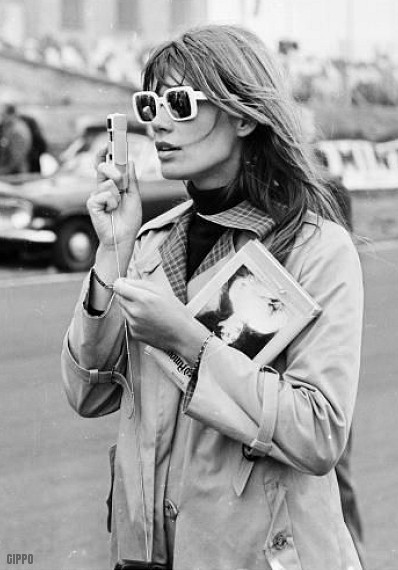Your destination for all genres of french music from around the world! Ta destination pour tous les genres de musique française globale!
Wednesday, July 28, 2010
Pardon My French is Moving!
As of August 5th, Pardon My French will be moving to Thursdays, from 2:30-4pm! An extra half an hour, a little earlier in the day, a little later in the week! I hope you stay tuned to cjam 99.1fm or stream it at cjam.ca.
Tuesday, July 27, 2010
Serge Gainsbourg
1. Serge Gainsbourg - Le poinçonneur des lilas (live aux Trois Baudets)
5. Serge Gainsbourg - Pauvre Lola
10. Serge Gainsbourg - L'hôtel particulier
12. Serge Gainsbourg - Toi dub (Toi mourir)
Wednesday, July 21, 2010
Next Week: Serge Gainsbourg

Wednesday, July 28th, Pardon My French will be featuring music by Serge Gainsbourg and covers of his songs and those that he has written. Also, Let's French will go into an in depth look at the life, career and generally trashiness of this French national treasure. So check out the website this week!
Do you have a favourite Gainsbourg song?
Yéyé avec moi.
 Annie Philippe – Baby Love
Annie Philippe – Baby Love
- Les Chaussettes Noires – Petite Sheila
- Olivensteins – Euthanasie
- Les Sextans- Par ma faute
- Coeur de Pirate – Printemps
- Stefie Shock – Tout le monde est triste
- Bruno Leys – Hallucinations
- Luna – Bonnie et Clyde
- Bobbejaan & Axelle Red – je me suis souvent demandé
- Les Mercedes – Um um um um
- Kenzo Saeki – 69 année érotique
- Jacqueline Taïeb – 7 heures du main
- Les Hou-Lops – Pour toute la vie
- Martin Léon – Je m’demande
- Yelle – À cause des garçons
What would you like to see for next week's show? Requests are always welcomed!
Friday, July 16, 2010
Let's French!: An In Depth Look at Yé-yé

Yé-yé is a genre of dance, pop music that was mainly spearheaded by women, many of whom were teenagers. Go-go would be the American equivalent to this movement. This was largely influenced by American twist and dance records, as well as British pop like The Beatles. This music was a celebration of youth: holidays, love, adventure. Joi de vivre was the definite mindset. Artists were generally from France, Quebec and Spain, although it gained popularity elsewhere, especially Japan.
Origins:
The style originated in the late 1950s and gained most of its popularity into the early 1960s. The term, coined in 1963 to describe the blossoming youth culture. The actual word comes from the English, "yeah! yeah!" which was heard in American twist records from the '50s. "Salut les copains" was a radio program in France at the time, which launched many careers of Yéyé artists and the culture in France.
Artists:
The majority of the Yé-yé artists were women. Some of the most famous women from this genre are Brigitte Bardot, France Gall, Sheila, and Françoise Hardy. There was a freedom in music that came with the influx of female liberation and youth culture in the 1960s. However, while some of this music promoted independent women, there was also a hyper-sexuality and Lolita culture, since many of the female artists were young. Authors of many popular songs from the time were men. Serge Gainsbourg, for example, wrote for France Gall, Petula Clark, and Brigitte Bardot.
"Poupée de cire, poupée de son" went on to become a huge hit in France and the following year Gainsbourg penned another best-selling single for France Gall, giving her the song "Les Sucettes". ("Les Sucettes" acquired its own special place in French music history. 19-year-old Gall's innocent performance of the song completely missed Gainsbourg's ironic/erotic subtext, much to the delight of certain French music critics). Apparently, France never quite grasped the full sense of Gainsbourg's famous double entendres, but the pair's collaboration came to an end shortly after "Les Sucettes" (RFI Musique).
There was also the trend of Yéyé Boys and fell into the non threatening male category of musicians: Michel Polnareff, Jacques Dutronc, Claude François.
One difference between France and Quebec at the time was the amount of male groups in Canada. There were the rare female groups, but it was mostly male dominated.
Culture:
Fashion and music went hand in hand during this time. Go-go boots, miniskirts and monokinis came out of this era of sexuality, youth and progress. This style originated in France, beginning in 1964 and then moving to England, where most associate the trend. Other new designers of the time were Pierre Cardin, Yves Saint Laurent and Daniel Hechter.
Decline:
In France, 1968 brought enormous change politically, culturally and musically. The student strikes in May of that year changed the landscape and the bubblegum music of the early 60s was fading. Rock and folk music from England and America were also having a large influence, especially on music with socio-political messages.
In Quebec, the decline of yé-yé came later than France, in the 1970s. The notion of Nationalism, straying from influences from foreign sources and returning to roots shifted the popularity of music. Traditional, Quebecois folk music became the vehicle for political messages and the main musical medium.
Tune in to Pardon My French, Wednesday July 21st from 6-7pm where Yéyé will a main topic of discussion. Listen in for Yéyé from France and Quebec from the 1960s, its influences today's music in Canada, Europe and Japan, and artists that inspired the genre.
Resources:
http://www.thecanadianencyclopedia.com/index.cfm?PgNm=TCE&Params=U1ARTU0004125
http://en.wikipedia.org/wiki/Yé-yé
http://www.teppaz-and-co.fr/accueil.html
Tuesday, July 13, 2010
Tuesday, July 6, 2010
Nationalism and Tradition
1. La ligue du bonheur - Le set américain
Also, here is a video of the Quebec nationalist poet Gaston Miron. Plume Latraverse sang one of his poems on the album "12 hommes rapaillés chantent Gaston Miron" (all the tracks, by many Quebecois artists, are wonderful).
Subscribe to:
Comments (Atom)